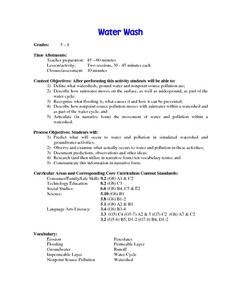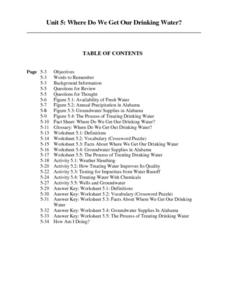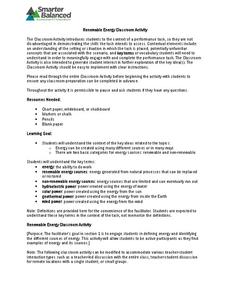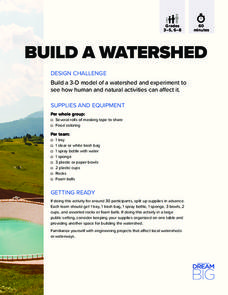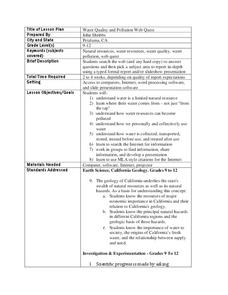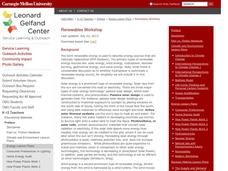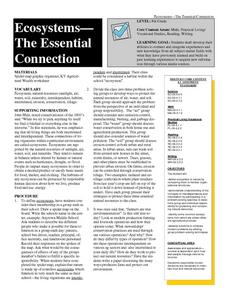Curated OER
Water Magic
Young scholars conduct experiments with ice, water and steam to observe the water cycle. They discuss substances that water accumulates from the Earth as it moves through its cycle.
Curated OER
Where Does Your Water Come From?
Learners engage in a lesson to determine the source of water that is used. They conduct research using a variety of resources. The lesson includes information for the teacher to share with the class. Students write and define the...
Rivanna Regional Stormwater Education Partnership
Invisible Passengers
How does water pollution affect the organisms living in the water? Use three science experiments to examine how erosion and other pollutants can affect water quality. Each experiment focuses on a different aspect of pollution and...
Curated OER
Water Wash
Students define watersheds, ground water and nonpoint source pollution. They describe how rainwater moves on the surface, as well as underground, as part of the water cycle. They recognize what flooding is as well as its causes.
Curated OER
Is That Natural?
Young scholars examine how they use and waste natural resources. They participate in a class discussion about natural resources, in small groups complete a worksheet identifying ways students misuse natural resources, and create an...
Curated OER
Water Cycle Terrariums
Students explore the water cycle. They build a model of the water cycle in the form of a terrarium and explain how it demonstrates the water cycle. In addition, they draw a representation of the water cycle demonstrated in the terrarium.
Curated OER
Water Resources
High schoolers study water resources that are important to the people of North American and Africa. They use satellite images and data to explore how human actions can degrade, improve, or maintain water resources. They analyze and...
Curated OER
Water Cycle
Ninth graders explore ways water moves through various reservoirs on Earth, examine how human activities change water cycle, investigate substances present in water that indicate human activity, and discuss how understanding water cycle...
Curated OER
Testing Your Water
Students perform several water quality tests on groundwater from their area. They use test strips to determine the pH, hardness, alkalinity, nitrates, iron and chloride levels.
Curated OER
Natural Disasters
Students create an expressive painting documenting their experience of a storm. They create a slide show presentation comparing and contrasting the impact and the response to a natural disaster in the 19th century with the impact...
Curated OER
Water Pressure - Disparity of Resources
Students examine the disparity of resources between developing and industrialized nations, and research the problem of water availability as world populations increase and natural resources are stressed.
Curated OER
Harvesting Water from Fog
Students analyze the water issues of Cape Verde in the Peace Corp lesson. In this water resources lesson, students analyze the concept of water being harvested from fog. Students explore the Peace Corps project site by watching Nathan...
Curated OER
Where Do We Get Our Drinking Water?
Students compare land to water ratio on our planet, list sources of drinking water, list steps in cleaning water in treatment plant, describe natural filtering process, and explain danger of not testing drinking water from private wells.
Smarter Balanced
Renewable Energy
Renewable and non-renewable energy sources are the focus of a series of activities that prepare learners for a performance task assessment on energy. Groups identify the various sources of energy and classify these sources as either...
Centers for Ocean Sciences
Ocean and Great Lakes Literacy: Principle 1
Is your current lesson plan for salt and freshwater literacy leaving you high and dry? If so, dive into part one of a seven-part series that explores the physical features of Earth's salt and freshwater sources. Junior hydrologists...
DiscoverE
Build a Watershed
What's the best way to learn how watersheds work? Build one! Combining engineering, the water cycle, and ecology concerns, the activity is the perfect fit for an interdisciplinary unit. Teams construct a model watershed with simple...
Curated OER
Water Quality and Pollution Web Quest
Learners explore how water is a limited resource, where it comes from, how it can become polluted and how it is used. In this water quality instructional activity students search the web to answer given questions and prepare a report...
Curated OER
Water Resources and the Role of the Independent Sector
Students identify the need to maintain and protect our natural resources. In this natural resource lesson, students study pictures of the effects of pollution on animals and water. Students brainstorm a list of ways water is an...
Curated OER
Who Will Care for the Water?
Students discover how humans impact natural resources. In this environmental lesson, students identify water resources in the local area and construct a T-chart to compare the positive and negative effects humans have on water resources.
Curated OER
Water - Planning for the Future
Students explore and examine the increases and/or decreases for water user groups: irrigation, municipal, manufacturing, steam electric power generation cooling, livestock, and mining. They utilize percentage changes during their...
Curated OER
Biomimicry, Nature: Architecture of the Future
Students explore the relationship between nature and architecture. In this cross curriculum history, culture, and architecture lesson, students observe and discuss structures visible in nature. Students view websites in which Native...
Curated OER
Moebius Strips
Students make Moebius strips and use them to demonstrate the interconnectedness of an environment. They explore the natural cycles (water, oxygen/carbon dioxide, carbon, nitrogen) within the environment. They describe how the cycles are...
Carnegie Mellon University
Renewables Workshop
Youngsters examine resource maps to find out which states are using solar and wind power and discuss as a class various other renewable energy sources. They use a provided data table to record pros and cons to each technology, build and...
Curated OER
Ecosystems-The Essential Connection
Young scholars develop their abilities to solve problems both in school and in a variety of situations similar to that they have encountered in life. They define the term ecosystem in nature by comparing them to familiar organizational...


